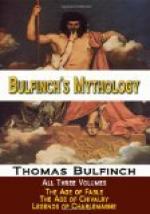have also; set therefore the mouse free.”
“I will not set it free, by Heaven,” said
he, “till I know who the mouse may be.”
“She is my wife.” “Wherefore
came she to me?” “To despoil thee,”
he answered. “I am Lloyd, the son of Kilwed,
and I cast the charm over the seven cantrevs of Dyved.
And it was to avenge Gawl, the son of Clud, from the
friendship I had towards him, that I cast the charm.
And upon Pryderi did I avenge Gawl, the son of Clud,
for the game of Badger in the Bag, that Pwyll, the
son of Auwyn, played upon him. And when it was
known that thou wast come to dwell in the land, my
household came and besought me to transform them into
mice, that they might destroy thy corn. And they
went the first and the second night, and destroyed
thy two crops. And the third night came unto me
my wife and the ladies of the court, and besought
me to transform them. And I transformed them.
Now she is not in her usual health. And had she
been in her usual health, thou wouldst not have been
able to overtake her; but since this has taken place,
and she has been caught, I will restore to thee Pryderi
and Rhiannon, and I will take the charm and illusion
from off Dyved. Set her therefore free.”
“I will not set her free yet.” “What
wilt thou more?” he asked. “I will
that there be no more charm upon the seven cantrevs
of Dyved, and that none shall be put upon it henceforth;
moreover, that vengeance be never taken for this,
either upon Pryderi or Rhiannon, or upon me.”
“All this shalt thou have. And truly thou
hast done wisely in asking this. Upon thy head
would have lit all this trouble.” “Yea,”
said he, “for fear thereof was it that I required
this.” “Set now my wife at liberty.”
“I will not,” said he, “until I
see Pryderi and Rhiannon with me free.”
“Behold, here they come,” he answered.
And thereupon behold Pryderi and Rhiannon. And
he rose up to meet them, and greeted them, and sat
down beside them. “Ah, chieftain, set now
my wife at liberty,” said the bishop. “Hast
thou not received all thou didst ask?” “I
will release her, gladly,” said he. And
thereupon he set her free.
Then he struck her with a magic wand, and she was
changed back into a young woman, the fairest ever
seen. “Look round upon thy land,”
said he, “and thou wilt see it all tilled and
peopled as it was in its best estate.”
And he rose up and looked forth. And when he
looked he saw all the lands tilled, and full of herds
and dwellings.
And thus ends this portion of the Mabinogi.
The following allusions to the preceding story are
found in a letter of the poet Southey to John Rickman,
Esq., dated June 6th, 1802:




